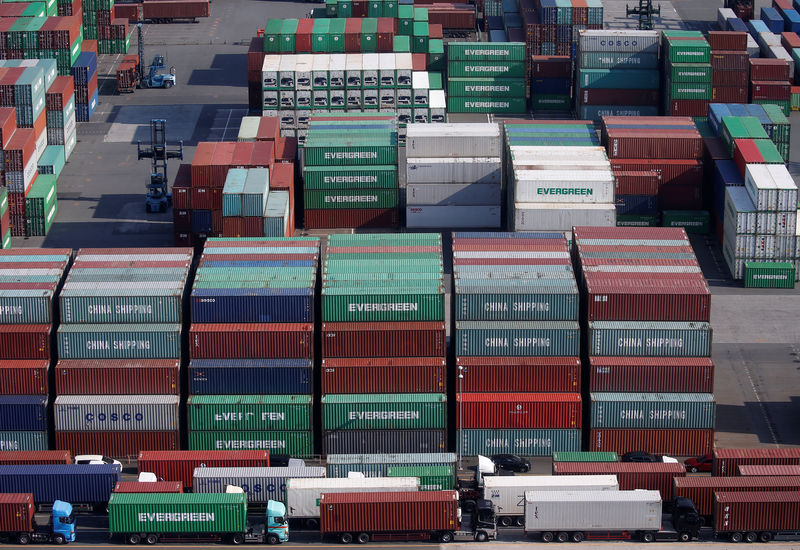By Tetsushi Kajimoto
TOKYO (Reuters) - Japan's exports posted their biggest decline in more than two years as China-bound shipments tumbled, fuelling concerns about slowing global demand as the business mood sours and orders for the country's machinery goods fell sharply.
Ministry of Finance data out on Wednesday showed Japan's exports fell 8.4 percent year-on-year in January, a bigger decline than the 5.5 percent fall expected by economists in a Reuters poll.
It was the sharpest annual decline since October 2016, and followed a revised 3.9 percent year-on-year drop last December.
The data came after a key gauge of Japanese capital spending showed overseas orders for machinery fell the most in more than a decade in December, and business sentiment soured to a two-year low, as trade friction and slowing Chinese growth bite.
Japanese exports to China, Japan's biggest trading partner, fell 17.4 percent year-on-year.
While the Lunar New Year holiday weighed on China-bound exports, analysts say there are more concerning drivers behind January's decline. In contrast, exports to China rose 30 percent year-on-year in January 2018.
"You cannot solely blame it on Chinese New Year holidays as China's slowdown becomes more evident as a trend, which is having ripple effects on slowing Japanese shipments elsewhere such as Asia and Europe," said Takeshi Minami, chief economist at Norinchukin Research Institute.
"As China's slowdown and its trade war with the United States cause global trade and the world economy to stall, Japan cannot count on exports to drive growth this year," he said.
Global trade has slowed as Washington and Beijing have been locked in a tit-for-tat tariff battle for months, which could have ripple effects on Japan's export-focused economy.
U.S. President Donald Trump said on Tuesday that trade talks with China in Washington this week were progressing well and suggested he was open to pushing back the deadline to complete negotiations, but provided few details.
Japan's shipments to Asia, which account for more than half of overall exports, fell 13.1 percent in January, dragged by China-bound steel flat rolls and South Korea-bound exports of semiconductor production equipment, the trade data showed.
Japan's exports to the European Union fell 2.5 percent in January year-on-year, down for the first time in four months.
U.S. TARIFF THREAT
U.S.-bound exports rose 6.8 percent, led by shipments of cars, which helped push Japan's trade surplus with the United States up 5.1 percent to 367.4 billion yen ($3.32 billion), its first increase in seven months.
Japan's imports from the United States rose 7.7 percent in the year to January, led by crude oil.
The increases in U.S.-bound exports and Japan's surplus with the country raise concerns among Japanese policymakers and auto exporters that Washington may impose hefty duties on its imports from trading partners, analysts say.
The U.S. Commerce Department sent a report on Sunday to U.S. President Donald Trump that could unleash steep tariffs on imported cars and auto parts.
Imports of Japanese cars make up about two-thirds of Japan's $69 billion annual trade surplus with the United States, making Tokyo and Beijing targets of criticism by Trump.
In January, U.S.-bound auto shipments grew 23.2 percent in January to 139,579 units, the trade data showed.
Japan's overall imports fell 0.6 percent year-on-year, a smaller decline than the median estimate for a 2.8 percent decrease.

The trade balance came to a deficit of 1.4152 trillion yen, versus a 1.011 trillion yen shortfall seen by economists.